GSA Schedule Guide: Meaning, Contracts, Application & Requirements
A GSA Schedule is a pre-vetted contract vehicle that makes it faster and easier for federal buyers to purchase what you’re already selling. Once you’re in, you’re positioned to win contracts from agencies that collectively spend tens of billions.
This guide walks you through everything you need to know, from what a GSA Schedule is, to how it works, what the process looks like, and whether it’s the right move for your business.
What Is a GSA Schedule?
A GSA Schedule, officially called a Multiple Award Schedule (MAS) or Federal Supply Schedule (FSS), is a long-term, government-wide contract that allows federal agencies to purchase goods and services directly from commercial vendors at pre-negotiated prices, terms, and conditions.
For you as the vendor, being on a GSA Schedule means getting shortlisted in an exclusive pool of pre-approved suppliers. What does that actually mean? Beyond gaining visibility, you’re positioned directly in front of agency buyers who are:
- Backed by funded budgets and the authority to issue six- and seven-figure contracts
- Focused on quick transactions, using the GSA list to bypass long bidding cycles and avoid unnecessary delays
- Ready to buy directly from a pre-approved vendor whose pricing and contract terms have already been vetted in advance (that’s you, if you’re on the GSA Schedule)
While the official name is “GSA Schedule Contract,” don’t be surprised if you hear it referred to by other names:
- GSA Contract
- GSA Price List
- GSA Catalog
- GSA Certified
- GSA Number
- GSA Approved
- GSA Federal Supply Schedule (FSS)
- Multiple Award Schedule (MAS)
All of these terms ultimately point to the same thing: a contract vehicle. A pre-negotiated purchasing arrangement actively managed by the General Services Administration, the federal agency that oversees procurement systems and vendor approvals.
How GSA Transactions Work
Here’s how the GSA transaction typically proceeds, from the initial vetting to the final exchange between buyer and vendor:
Responsible Party | Steps |
Vetting Stage | |
GSA | 1. GSA reviews and vets vendor application (i.e. your application), including pricing, past performance, and financials |
GSA | 2. GSA awards the GSA Schedule contract, officially uploading your offerings into federal systems like GSA eLibrary and GSA Advantage! |
Selection Stage | |
Buyer | 3. The agency realizes it wants to avoid the long, expensive, and paperwork-heavy process of open-market contracting. It browses GSA Advantage! or eLibrary to find approved vendors under the appropriate Special Item Number (SIN) that matches what they need |
Buyer | 4. Agency finds your company on GSA platforms and identifies you as a strong match. This is likely because of your competitive pricing, favorable terms, or specialized offerings listed in your GSA-approved catalog. |
Transaction Stage | |
Buyer | 5. Agency sends a Request for Quote (RFQ), usually through GSA eBuy. |
Vendor | 6. You respond to the RFQ with a quote. No need to renegotiate terms, since they’re already approved under your GSA contract |
Buyer | 7. Agency issues a Purchase Order if your quote is accepted, awarding the task order under your Schedule number |
Vendor | 8. You deliver the product or service per the agreed scope |
Vendor | 9. You receive payment via federal payment systems, usually through electronic transfer after invoicing through platforms like IPP or agency-specific portals. |
What Does a GSA Schedule Look Like
As mentioned earlier, once you’ve been vetted by the GSA and officially awarded a Schedule contract, your business becomes part of the federal procurement ecosystem. Below are the main components of your GSA Schedule that show up during a buyer’s search:
- GSA Contract Number – Think of this as your federal vendor ID. It’s tied to your company, your offerings, your pricing, and your terms. It’s what contracting officers reference when issuing awards.
- GSA eLibrary Listing – This is your official profile within the GSA’s directory. It includes your contract details, awarded SINs (Special Item Numbers), points of contact, and basic business info.
- Authorized Price List – A downloadable PDF or spreadsheet that lists exactly what you sell, at what price, under what terms. This makes comparison-shopping easy for agencies.
- GSA Advantage! Catalog – Your digital storefront. If eLibrary is your LinkedIn profile, this is your Amazon product page. Buyers can view your catalog like they would on any e-commerce site.
Benefits of Having a GSA Schedule Contract
Access to Exclusive GSA Marketplaces
We’re talking about access to $33B+ in annual government purchases made through exclusive platforms like GSA Advantage and GSA eBuy – tools most businesses never even see, let alone compete in.
Contrary to the usual assumption, the federal market is far less saturated. In fact, about 44% of federal awards only get one bid. This often puts you in a room with just a few other vendors, which is very different from chasing crowded public bids.
That’s why many vendors call the GSA Schedule a “license to hunt.” Once you’re listed, agencies at every level, whether federal, state, or local, can buy directly from you without the usual bureaucratic slowdowns.
Recognition as a Trusted Government Vendor
You don’t actually need a GSA schedule to do business with the government. However, securing one positions you as a trusted source in the eyes of federal buyers. It gives you instant credibility, making you more likely to be chosen over a non-GSA contractor.
Simplified Sales Process
Overall, the GSA Schedule takes a lot of friction out of the buying process, the primary reason being that critical steps such as vetting, compliance checks, and pre-negotiated pricing are already built into the contract. This slashes the need for lengthy negotiations or pricing justifications later on.
For you as the vendor, that means a faster, simpler path to getting paid. Much of the boilerplate language that normally clogs up government award documents is already taken care of during the contracting process, so transactions can move forward without delays.
Types of GSA Schedules and Contracts
There are 12 GSA Schedule Categories to choose from. These are industry-based categories that range from IT Services to Office Supplies.
See the full list below and click the Category to see full details and subcategories (called Special Item Number or SINs).
MAS Category | MAS Subcategory | Additional Notes* |
Structures, Facilities Services, Food Service Equipment, Facilities Supplies, Facilities Solutions, Facilities Maintenance and Repair | previously GSA Schedule 03FAC, Schedule 56 and Schedule 73 | |
Office Furniture, Flooring, Fitness Solutions, Signs, Household, Dormitory & Quarters Furniture, Packaged Furniture, Healthcare Furniture, Misc. Furniture | previously GSA Schedule 71 and Schedule 72 | |
Human Resources, Background Investigations, Compensation and Benefits, Temporary Help Services, Social Services | previously GSA Schedule 736 and Schedule 738X | |
Industrial Products, Packaging, Cleaning Supplies, Safety Equipment, Hardware and Tools, Fuel Management, Machinery, Test Equipment, Maintenance and Repair | previously GSA Schedule 51V | |
Printing Equipment, Office Supplies, Audio Visual Products, Media Services, Document Services, Records Management, Mail Management, Office Services | previously GSA Schedule 75, Schedule 36, Schedule 76, and Schedule 58I | |
Marketing, Financial, Legal, Technical & Engineering Services (non-IT), Business Admin, Logistics, Language, Environmental, Training, Identity Protection | previously GSA 00CORP | |
IT Hardware, IT Software, Telecommunications, IT Solutions, IT Training, Electronic Commerce, IT Services | previously GSA Schedule 70 | |
Apparel, Complimentary SINs, Personal Hair Care Items, Musical Instruments, Awards, Flags | previously GSA Schedule 78 | |
Laboratory Equipment, Laboratory Animals, Search and Navigation, Medical Equipment, Testing and Analysis, Scientific Services | previously GSA Schedule 66 | |
Testing Equipment, Protective Equipment, Security Services, Security Systems, Security Animals, Marine and Harbor | previously GSA Schedule 84 | |
Motor Vehicles (non-Combat), Auto Body Maintenance & Repair, Packaging Services, Delivery, Transportation of Goods | previously GSA Schedule 48, Schedule 23V, Schedule 81IV, and Schedule 751 | |
Employee Relocation, Lodging, Travel Agent Services, Misc Travel Services | previously GSA Schedule 599 |
*The legacy GSA schedules indicated are no longer active. All of them were merged into the unified GSA Multiple Award Schedule (MAS) contract, organized under 12 Large Categories with corresponding Subcategories and SINs.
Is a GSA Schedule suitable for your business?
Here’s the simplest way to think about it: If your product or service is something federal agencies already buy, and you’re ready to grow through consistent, high-dollar government contracts, then a GSA Schedule can open doors that the open market won’t.
But of course, a GSA Schedule isn’t right for every business.
There are specific qualifications and conditions that determine whether you’re eligible, and whether it’s the right move based on where your business is today. I’ve outlined those considerations in the sections below.
GSA Schedule Requirements for Vendors
Below is a top-level overview of the general vendor requirements, based on the official GSA roadmap to getting a MAS contract:
2 Years in Business and Financial Stability
To prove you’re financially responsible and capable of fulfilling federal contracts:
- Be in business for at least 2 years (or qualify for Startup Springboard)
- Submit two years of financial statements
- Provide a Balance Sheet and Income Statement
Completed Mandatory GSA Training
Before applying, your company’s designated negotiator must:
- Complete the “Pathways to Success” training
- Fill out the Readiness Assessment form
This confirms your understanding of GSA Schedule requirements and obligations.
Relevant Projects and Supporting Documentation
To show your capability and credibility in delivering your product or service:
- Submit at least 2 examples of past work that match the scope of your proposed SIN(s)
- Include copies of previous government or commercial contracts
- Complete the Technical Proposal Narrative template
Transparent Commercial Sales Practices
To establish your pricing as fair, consistent, and reasonable, you’ll need to show how it aligns with your commercial pricing. This typically includes:
- Filling out the Commercial Sales Practices (CSP-1) form (unless you’re using Transactional Data Reporting (TDR) – but that’s a conversation for another day)
- Submitting your Commercial Price List
- Disclose any standard discounts offered to other customers
This information actually forms the basis of your pre-negotiated GSA pricing.
Technical Proposal and Compensation Plan (for Services)
If you’re a service provider, you must:
- Submit a detailed Technical Proposal Narrative
- Submit a Professional Compensation Plan (if required by SIN)
This validates your operational model and internal pay structure.
TAA Compliance for Products
If you’re offering products instead of services, GSA only accepts items that comply with the Trade Agreements Act (TAA). To prove this, you’ll need to:
- List the Country of Origin for each product
- Confirm that each item is made or substantially transformed in a TAA-compliant country
- Use the correct Product Template provided in the solicitation package
Active Government Registrations
Before you apply for a GSA schedule, ensure that you have set up the following:
- sam.gov registration: Required to validate your business identity and eligibility for federal contracts
- Unique Entity ID (UEI): A government-issued ID used to uniquely identify your business in federal databases
- FAS ID: Needed to access and submit offers through GSA’s eOffer and eMod systems.
How to Apply for a GSA Schedule
The first step to applying for a GSA Schedule Contract – and this is something we at GSA Focus help clients with, given how critical it is – is making sure it makes sense for your business in the first place, from the risks and costs to the potential rewards of getting on Schedule.
Once that’s out of the way, here’s how the application process typically proceeds:
Step 1: Review the MAS Solicitation Package
The MAS solicitation package outlines exactly what GSA expects from you as a vendor, depending on the products or services you’re offering. Pay close attention to the category-specific requirements, templates, and offer checklists.
Step 2: Gather and Prepare Your Documentation
This is where proposal writing comes in. You’ll essentially be creating your technical and pricing proposal using GSA’s required templates – many of which we touched on earlier in the section on vendor requirements – including:
- Business financial statements
- Pricing templates
- Past performance references
- Technical narratives
- Compliance forms (e.g. Trade Agreements Act for products)
The GSA website has a long list of these templates, which you can find here.
Step 3: Complete Your Online Registrations
Make sure you’re registered within the essential platforms—SAM.gov, FAS ID, and UEI, as mentioned earlier—since these accounts validate your business identity and give you access to the systems needed to complete and submit your application.
Step 4: Submit Your Offer via eOffer
Once everything is in order, submit your application through GSA’s eOffer system. This includes uploading all required documents, certifying training completion, and electronically signing your offer.
GSA will then assign a Contracting Officer to review your submission. Expect a round of follow-ups here as your assigned CO may reach out to clarify sections of your offer or negotiate pricing and terms before making a final decision.
Step 5: Contract Award and Onboarding
If your offer is accepted, you’ll receive a GSA contract award. But your work isn’t done just yet. You’ll need to:
- Upload your approved catalog to GSA Advantage
- Start responding to opportunities via GSA eBuy
- Maintain compliance with sales thresholds and modification requirements
This step sets you up to start marketing and selling your offerings directly to government agencies.
How long does it take to obtain a GSA Schedule contract?
The processing timeline can take up to 12 months from the time you submit your offer to getting awarded a GSA Schedule contract.
There’s no fixed timeframe, since several factors can impact the pace, such as how complete and accurate your offer is, the complexity of your category, and even your Contracting Officer’s workload.
Why Work With a GSA Schedule Consultant?
If we take a step back and look at the whole process, everything from specific requirements and steps to the documentation comes down to three big realities:
- You’ll have to read through 100+ pages of forms and templates – and just when you think you’re done, a new version gets released, and you’ll have to update everything again.
- You’ll have to juggle a lot of compliance-related tasks. That usually means pulling complex documentation, double-checking fine print, and oftentimes even consulting with lawyers.
- You’ll go through repeated exchanges with your Contracting Officer to clarify/fix sections and negotiate pricing – which, for many of our clients, drains time they’d rather use to scale their business.
Of course, you can absolutely go the DIY route – but only if you’re prepared to take on a mentally taxing process that eats up hundreds of hours you could’ve spent growing your company.
If you’d rather not (and most businesses with real priorities and bigger goals usually don’t), that’s exactly why GSA schedule consulting partners, like us at GSA Focus, exist. With a GSA Schedule consultant, you can:
- Avoid the slog of paperwork (which can easily take 100+ hours) and instead focus on your business.
- Avoid costly mistakes and missteps, since we’ll be the ones to position your offer, submit the right documents, and align everything with what the Contracting Officer is actually looking for.
- Improve your odds of securing the GSA contract and shorten the timeline. (In fact, we’re proud to say that GSA Focus has a 98% success rate with the clients we’ve worked with.)
“But this is a service that comes with a cost!”
True, but think about it: You’re unlocking access to over $50M in daily opportunities through GSA. The average ROI? About 87%. Oftentimes, GSA consultants even offer a refund guarantee (like we do) if it doesn’t work out.
In this kind of market where the upside is that high, not investing is what actually costs you…
So the real question is: can you afford not to?
If you want to have a clearer understanding of how it all connects to your business, the best next step is to chat with a GSA Schedule consultant. We at GSA Focus offer a FREE, no-obligation consultation. We’re happy to help you get started.
GSA Platforms for Vendors
Once you’ve been awarded a GSA Schedule, the platforms below are where your contract lives, where buyers shop, and where you’ll manage the ongoing aspects of your GSA relationship, with each platform having a specific role. We’ve touched on each one throughout this article, but here’s a clear rundown to help you keep track.
GSA Advantage!

GSA Advantage! is your government-facing product catalog. This is where your products or services are listed with descriptions, pricing, and terms pulled directly from your awarded GSA contract.
GSA eLibrary
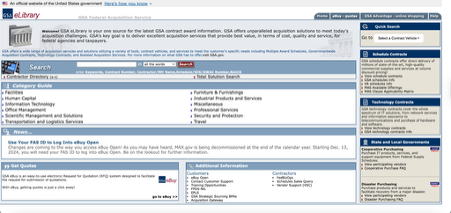
GSA eLibrary is your official vendor profile in the GSA system. It shows your contract number, awarded SINs (Special Item Numbers), points of contact, and contract terms. Agencies use it to verify your eligibility and capabilities before initiating contact.
GSA eBuy
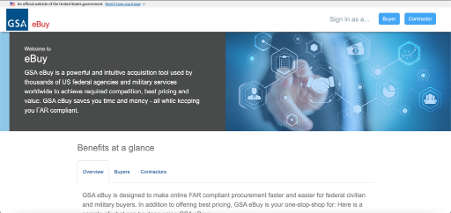
GSA eBuy is the platform for posting RFQs (Requests for Quotes), used by federal buyers and accessible only to GSA-approved vendorsexclusively accessible for GSA-approved vendors only. As a vendor, this is where you log in, browse relevant RFQs tied to your SINs, and submit quotes.
Acquisition Gateway
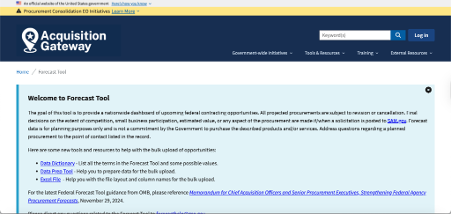
Acquisition Gateway is a research tool created by GSA to help government acquisition professionals compare solutions and make informed decisions.
While not a sales platform, vendors can use it to better understand what these agencies value, which contract types they prefer, how budget is allocated across categories, and how competitors are positioning themselves.
SAM.gov
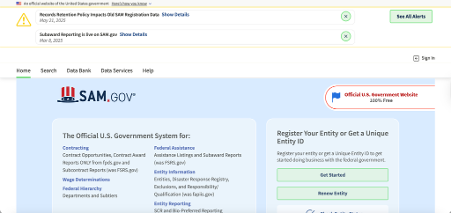
SAM.gov is where you register your business to even be eligible for a federal contract. It’s not a GSA platform per se, but it’s required to begin your GSA journey.
eOffer / eMod
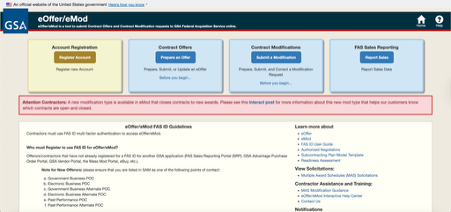
These are the official portals for submitting and modifying your GSA contract. eOffer is used during your initial proposal submission, while eMod is used for changes, such as updating pricing, adding SINs, or revising contact details.
Keeping your information current is crucial, considering outdated info can easily lead to missed opportunities, compliance issues, or even rejection during audits.
GSA OSDBU Social Media Platforms
The Office of Small and Disadvantaged Business Utilization (OSDBU) regularly shares training, events, and contracting opportunities through platforms like Twitter and LinkedIn (@GSAOSDBU). It’s a useful source of real-time insights and event announcements if you’re a small or disadvantaged business.
Frequently Asked Questions
Can large businesses have a GSA Schedule?
Yes. In fact, businesses of any size can apply for a GSA Schedule as long as they meet the eligibility requirements. That includes being financially stable, offering commercially available products or services, and being willing to undergo the full vetting process.
What is a GSA Schedule number?
Your GSA Schedule number (or Multiple Award Schedule number) is the official contract number assigned to you once your Schedule is awarded. It’s used by government buyers and contracting officers to identify your contract in GSA systems like eLibrary, Advantage!, and eBuy.
What are GSA Schedule rates?
GSA Schedule rates are the pre-negotiated prices you agree to during the application process. These rates must be fair and reasonable and are typically lower than your commercial pricing. They serve as a pricing ceiling in most cases and are used as a baseline in all GSA transactions.
What is the maximum order threshold for a GSA Schedule?
The Maximum Order Threshold (MOT) varies depending on the SIN (Special Item Number). Orders above the MOT don’t violate your contract, nor do they trigger any penalties. They simply require the buyer to seek additional discounts or compare other quotes before finalizing the purchase.
Is getting on the GSA Schedule worth it?
Absolutely, especially if your offerings align with what federal agencies are already buying. The GSA Schedule opens the door to billions in federal spending, shortens the typical procurement cycle, and gives you credibility that most private vendors don’t have.
Who can use GSA Schedules?
Federal agencies, some state and local governments, and non-profit organizations (under certain circumstances) can all purchase through GSA Schedules.
How long does it take to obtain a GSA Schedule contract?
Generally, you can expect the process to take 6–12 months, but the exact timeline can vary from business to business. It depends heavily on how complete and accurate your proposal is, as well as the category you’re applying under. Working with a GSA consultant can often shorten this timeline by helping you avoid the common mistakes that occur in a DIY application.
What’s the difference between a GSA Schedule contract and the open market?
Open-market purchases involve public bids, longer timelines, and more paperwork. GSA Schedule contracts, on the other hand, are pre-negotiated and faster, which means agencies can buy directly from you with minimal friction.
Do I need to be on a GSA Schedule to sell to the government?
Not always. Some agencies do still buy from open-market vendors, especially for niche or urgent needs. But being on a Schedule gives you a major advantage by reducing procurement barriers and making you easier to buy from.
Is a GSA Schedule the same as a project-specific contract?
No. A GSA Schedule is an Indefinite Delivery/Indefinite Quantity (IDIQ) contract. That means there’s no guaranteed minimum purchase, but also no fixed cap on orders (though some SINs include Maximum Order Thresholds)
What’s the difference between a GSA Salary Schedule vs GSA Schedule contract?
These terms are unrelated. The GSA Salary Schedule refers to pay grades for federal employees (like the GS pay scale). A GSA Schedule contract is a procurement tool used by agencies to buy goods and services from vetted vendors.
